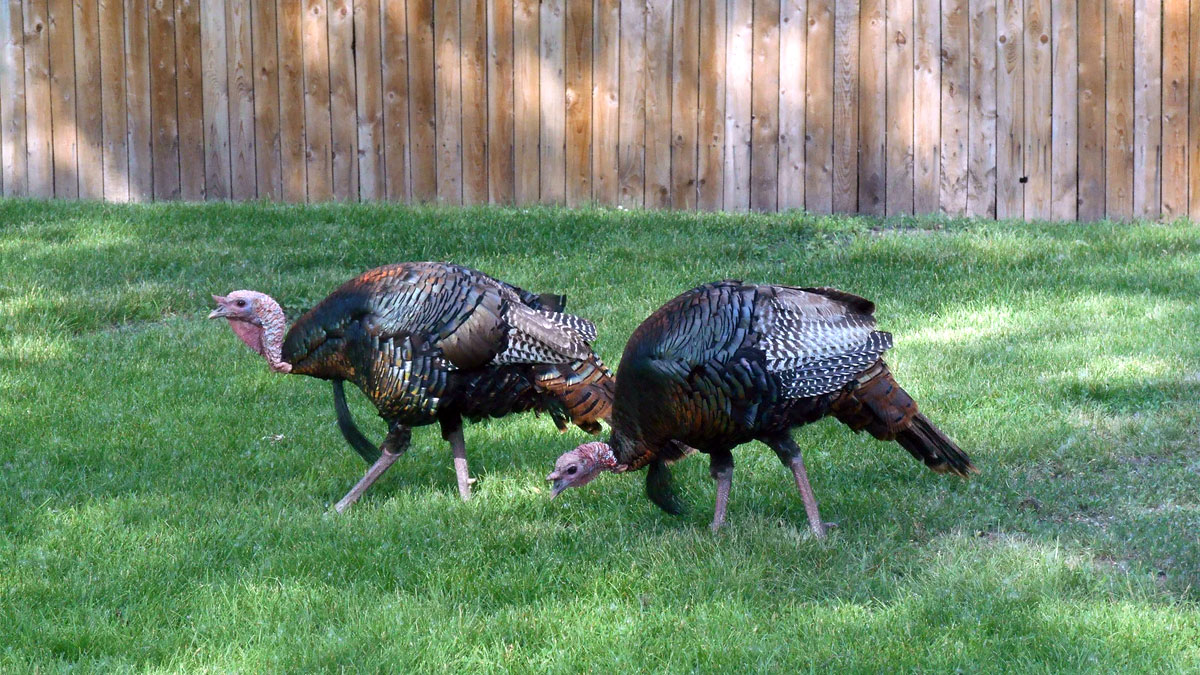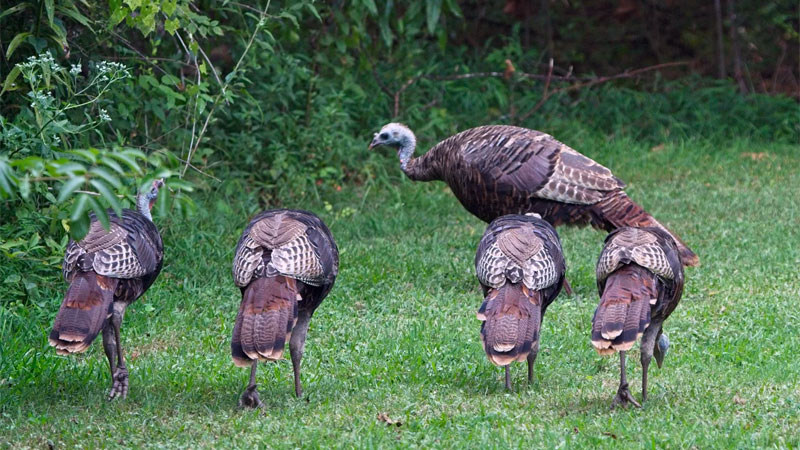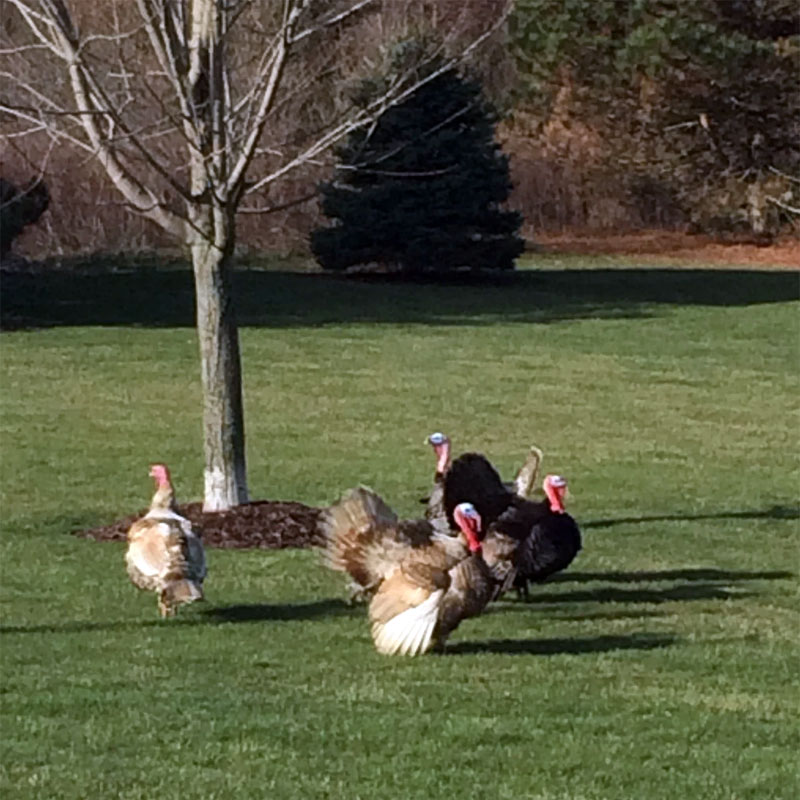Turkeys get a lot of attention in the media this time of year, what with Thanksgiving and all, but that doesn’t mean you necessarily want to see a bunch of gobblers strutting their stuff around your yard. Wild turkeys are not animals you typically think of as likely to turn up in your backyard. Increasingly, though, they do.
They live in every state except Alaska, and with natural areas increasingly becoming urbanized, residential areas become habitat for wild turkeys and other wildlife. They’re just trying to survive—foraging, looking for mates, roosting—but their proximity to homes can sometimes alarm people who have never encountered a turkey not on their plate.
You may find them roosting on your deck, your roof, or the roof of your car. Or, they may forage in your garden or under your bird feeders.
These social birds have a pecking order, so they may get bossy toward people they perceive to be intimidated by them. If you’ve got wild turkeys in your yard, you’ve just found solid advice for effectively dealing with them, so read on.
Understanding Wild Turkey Behavior
To effectively deter wild turkeys, it helps to understand some of their habits and traits. Turkeys are highly social, living in gender-segregated flocks outside of mating season. A hierarchy exists within each flock, with dominant males and females establishing a “pecking order.”
Aggression and Displays
Turkeys use aggressive displays like puffing feathers, charging, pecking and chasing to establish dominance. During breeding season, male turkeys can become territorial, attempting to attract females through strutting displays.
Mother hens may act most aggressively in spring to protect nests. Being aware of these typical behaviors allows you to avoid provoking confrontations.
Roosting and Foraging
Turkeys prefer to roost in trees at night and may see roofs, vehicles, and other high perches as attractive alternatives if trees are limited. Turkeys spend days wandering and foraging on the ground for seeds, insects, greens, berries and more.
They feel vulnerable while feeding and appreciate having trees to quickly escape under when startled. Near homes, turkeys take advantage of lawns for grazing and unsecured trash for scavenging.
Seasonal Behaviors
Turkeys mate in late winter into early spring. Hens nest on the ground, laying eggs over several weeks in early spring. Mother turkeys incubate eggs for 25-31 days, while toms wander separately in “bachelor flocks.”
By summer, poults emerge and follow hens who show them feeding areas. By fall, poults can fly and roost in trees rather than ground nests. Winter flock sizes grow as groups merge for safety and to search for food. Being aware of these seasonal patterns helps inform effective timing of deterrents.
What To Do and How to Behave Around Wild Turkeys
As with any unwelcome wildlife, you want to eliminate or minimize the things that attracted wild turkeys to your yard in the first place. They also need to understand they’re not welcome, so here’s your plan:
- Do not feed them, and—this is important—discourage neighbors from feeding them. This includes unintentional feeding, such as spillage that collects under birdfeeders. If spillage cannot be raked up daily, consider taking bird feeders down until they have moved on.
- Scare turkeys off decks and away from gardens. How far you escalate the scaring will have to do with how hardened they are on the site. Yell at them, push them along with brooms, throw tennis balls at them, squirt them with a hose or water gun, and even chase them with your dog on a leash. Performing a combination of these things will provide the best results.
- Be consistent. You can’t be friendly or indifferent one day, attempt to scare them another day, and assume that they’ll get the message. Nor can some members of the family or some neighbors choose to be friendly or indifferent. If you want your efforts to frighten them off to be effective, everyone needs to be on the same page.
- If male turkeys appear to be fighting with their reflections in mirrors, windows, or shiny car doors, first frighten them off and then cover the shiny surface they saw their reflection in. They think their reflection is a rival male, and may continue to try to make “him” go away unless you eliminate the reason for the confusion.
- If you’re encountering wild turkeys foraging along road edges in your neighborhood, be watchful, and be aware that if one crosses, others are likely to follow.
Things to Help Your Efforts
Your initial responses to wild turkeys in your yard are the most important thing to getting them to leave. Be bold, firm, and consistent with them. But, it’s good to know about some additional means to support your efforts.
- Motion-activated sprinkler devices, such as the Orbit Yard Enforcer, can discourage wild turkeys from foraging in your garden.
- Alternatively—or as a supplement to the motion-activated sprinklers—you can protect garden crops with hardware cloth staked fencing.
- Depending on the situation, electronic bird repellers, like the Bird-X Balcony Gard, may make your yard seem unsafe to wild turkeys. These devices typically emit hawk calls or distress calls, or some interfere with the turkeys’ communication. All tend to make them nervous, and may play a role in moving them along.
- For roofs or deck rails that attract unwelcome roosting turkeys, products are available through companies like BirdBarrier that will make the surface inaccessible to them for perching.
- Predator kites (like this one) are an option for large yards or gardens that need to be protected. Hovering overhead, they make turkeys nervous, much the same way a real predator would, helping to encourage turkeys to seek other digs.
- Placing reflective flash tape on stakes around a garden, on tree limbs, or on deck railings can create a visual disturbance that combined with other efforts above may make turkeys uncomfortable and encourage them to move on.
The combined use of these approaches should yield a positive outcome for you. So, whether it’s the turkey’s month to have their 15 minutes of fame or not, there’s rarely, if ever, a reason to resort to inhumane or lethal measures to get turkeys to leave.
In any case, lethal methods are notoriously ineffective, because other turkeys would simply come along to take their place.
The solution to unwanted turkeys in your yard is often in your control—through eliminating their sense of safety and the tempting foods that make turkeys feel welcome, as well as maintaining a firm and steady response to their attempts to hang around.
Professional Help and Legal Considerations
When Problems Persist
If wild turkeys fail to leave your property despite diligent humane harassment efforts, you may need to call in wildlife professionals as a last resort.
Persistent turkeys accustomed to humans typically must be trapped and relocated to have a chance at surviving in the wild. Professionals can assess the situation, set appropriate traps, and transport problematic birds legally to suitable habitat.
Trapping Regulations
Laws and permit requirements related to trapping and relocating wild turkeys vary significantly across the country, and even by county or city.
Wildlife removal experts understand and comply with applicable regulations in your region. Untrained individuals who attempt to trap turkeys may accidently harm the birds or face legal penalties for unlawful trapping.
Relocation Practices
Because wild turkeys exhibit loyalty to their home territories, relocated birds often try returning to their capture site.
Wildlife professionals follow best practices by moving birds at least 100 miles away and releasing flocks together in appropriate habitats during the fall or winter seasons. This gives them their best chance of assimilating into a new environment.
Seeking quick remedies by releasing turkeys illegally close by virtually guarantees new conflicts arise. Let qualified humane wildlife control operators determine effective capture protocols and relocation sites based on ecologically sound principles and legal requirements.
- How to Identify Skunk Poop (With Pictures) - April 1, 2024
- You Really Don’t Need That Opossum Trap - January 4, 2024
- How to Set a Mouse Trap Without Getting Hurt - December 28, 2023



